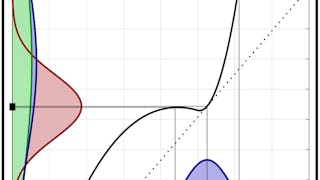Filter by
SubjectRequired
LanguageRequired
The language used throughout the course, in both instruction and assessments.
Learning ProductRequired
LevelRequired
DurationRequired
SkillsRequired
SubtitlesRequired
EducatorRequired
Explore the Derivatives Course Catalog

École Polytechnique Fédérale de Lausanne
Skills you'll gain: Spatial Analysis, Spatial Data Analysis, GIS Software, Geographic Information Systems, Geospatial Mapping, Geostatistics, Interactive Data Visualization, Data Integration, Data Mapping, Augmented Reality, Sampling (Statistics)

Alfaisal University | KLD
Skills you'll gain: Investment Banking, Mergers & Acquisitions, Securities (Finance), Capital Markets, Derivatives, Financial Market, Financial Services, Commercial Banking, Equities, Underwriting
 Status: Free Trial
Status: Free TrialUniversity of Colorado System
Skills you'll gain: Matlab, Estimation, Numerical Analysis, Performance Tuning, Mathematical Modeling, Control Systems, Simulation and Simulation Software, Derivatives, System Implementation, Calculus, Computer Programming Tools
 Status: Free Trial
Status: Free TrialUniversità di Napoli Federico II
Skills you'll gain: Securities (Finance), Portfolio Management, Equities, Investments, Financial Market, Finance, Fixed Asset, Risk Modeling, Derivatives, Asset Management, Capital Markets, Statistical Methods, Financial Analysis, Return On Investment, Risk Analysis, Regression Analysis, Time Series Analysis and Forecasting, Estimation
 Status: New
Status: NewSkills you'll gain: Calculus, Integral Calculus, Applied Mathematics, Numerical Analysis, Mathematics Education, Derivatives, Mathematical Theory & Analysis, Advanced Mathematics
 Status: New
Status: NewKoç University
Skills you'll gain: Numerical Analysis, Calculus, Applied Mathematics, Integral Calculus, Mathematical Software, Mathematics Education, Advanced Mathematics, Mathematical Theory & Analysis, Derivatives
 Status: New
Status: NewPolitecnico di Milano
Skills you'll gain: Calculus, Applied Mathematics, Derivatives, Algebra, Mathematical Theory & Analysis, Geometry, Graphical Tools, Graphing

Pontificia Universidad Católica de Chile
Skills you'll gain: Financial Statement Analysis, Financial Statements, Capital Markets, Accrual Accounting, Financial Analysis, Income Statement, Derivatives, Digital Transformation, Risk Management, Business Valuation, Financial Reporting, Balance Sheet, Financial Data, Financial Accounting, Corporate Strategy, Value Propositions, Securities (Finance), Capital Budgeting, Corporate Finance, Technology Strategies

Pontificia Universidad Católica de Chile
Skills you'll gain: Financial Statement Analysis, Descriptive Analytics, FinTech, Financial Statements, Business Analytics, Business Valuation, Derivatives, Strategic Decision-Making, Portfolio Management, Customer Analysis, Risk Analysis, Credit Risk, Digital Transformation, Cloud Security, Assertiveness, Governance, Financial Analysis, Object Oriented Programming (OOP), Investments, Financial Data
In summary, here are 9 of our most popular derivatives courses
- Geographical Information Systems - Part 2: École Polytechnique Fédérale de Lausanne
- مقدمة عن بنوك الاستثمار: Alfaisal University | KLD
- Nonlinear Kalman Filters (and Parameter Estimation): University of Colorado System
- Asset Pricing Models: Università di Napoli Federico II
- KALKÜLÜS II: TEMEL KAVRAMLAR / CALCULUS II: BASIC CONCEPTS: Koç University
- KALKÜLÜS III: UYGULAMALAR / CALCULUS III: APPLICATIONS: Koç University
- Le Derivate: come si calcolano: Politecnico di Milano
- Certificado en Finanzas Corporativas: Pontificia Universidad Católica de Chile
- Magíster en Inversiones y Finanzas Aplicadas: Pontificia Universidad Católica de Chile










